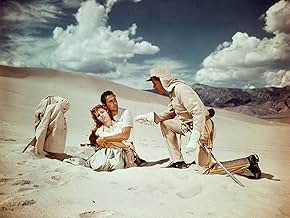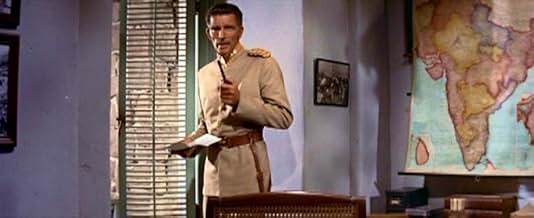Adicionar um enredo no seu idiomaA half-caste British officer in 19th-century India battles the prejudices of both his Army colleagues and the local populace while trying to help put down a rebellion led by a greedy local r... Ler tudoA half-caste British officer in 19th-century India battles the prejudices of both his Army colleagues and the local populace while trying to help put down a rebellion led by a greedy local ruler.A half-caste British officer in 19th-century India battles the prejudices of both his Army colleagues and the local populace while trying to help put down a rebellion led by a greedy local ruler.
- Direção
- Roteiristas
- Artistas
- Prêmios
- 1 indicação no total
- Ali Nur
- (as Frank de Kova)
- Native Dancer
- (as Sujata)
- Servant
- (não creditado)
- Bit Role
- (não creditado)
- Afridi Horseman
- (não creditado)
- Soldier
- (não creditado)
- Afridi Horseman
- (não creditado)
- Hamid Bahri
- (não creditado)
- Singer
- (não creditado)
Avaliações em destaque
"King of the Khyber Rifles" gets the full major picture treatment, in CinemaScope, and it is a film filled with battles, adventure, panaromas, and a little romance thrown in. You can't have Tyrone Power in a movie without some of that! He plays a half-caste who is put in charge of the Khyber Rifles. Eventually, he is given the assignment of putting down a rebellion led by a childhood friend, Karram Khan, menacingly played by Guy Rolfe. Terry Moore plays the British daughter of the brigadier general (Michael Rennie) who falls in love with Power, and that's a forbidden love. In real life, when she first saw the actor, she was so staggered that she developed a facial tic. Power asked King if they could sit quietly and run lines before shooting the scene, which allowed her to calm down. She's fairly vapid in the role.
The last part of the movie is very exciting and beautifully photographed. The film definitely hold's one's interest.
Power looks great - handsome and tanned, as Lieutenant King, but it's really not much of a role. The romantic scenes are marvelous, and he does display a lot of physical prowess. He was unfortunately one of the huge stars of the golden era who did not do a lot of great pictures. Ironically, some of his films not highly thought of at the time have found appreciative audiences today, 47 years after his death. Too bad he's not here to see it.
Top desert caper that was all audiences wanted to see in the 50's. No-one swashbuckled better than Tyrone Power during this period and KING OF THE KHYBER RIFLES was a handsome production, especially on the gigantic CINEMASCOPE screen. Directed by action-specialist Henry King, who worked with Power in almost a dozen movies, the story was that of half-caste British soldier Alan King (Power) who had to battle not only Army etiquette but a rampaging uprising around the Khyber Pass! The well remembered image from this flick was the spearing of the helpless British soldiers at the stake. Power of course, gaining a last minute reprieve so he could complete the movie, take down the villains and win the girl.
Good supporting cast, Michael Rennie in particular cutting an impressive figure as Brigadier Maitland whose stiff upper lip was stiffer than most!
Good companion piece to this was ZARAK (Also reviewed somewhere!)
KING OF THE KHYBER RIFLES explores King's personal difficulties as he tries to find his own social position, living in uneasy suspension between the world of the native and the foreign sahibs, torn between them; only the adventurous experience can resolve his status. Prejudice against King emerges because of his parentage; fellow officers refuse to be billeted in the same quarters, and he is conspicuously not invited to the queen's birthday ball. The stress is not simply on his courage but more on the numerous challenges he must face in daily living. A social outcast at the fort, King is most secure in the home of his adopted father, Hamid Bahra, a Moslem holy man; the picture was originally to end with King returning to Bahra before joining Susan. KING OF THE KHYBER RIFLES has a lone hero and none of the emphasis on military camaraderie, or the careless, Boys' Own tone to be found in such films as GUNGA DIN. Authentic details of Indian atmosphere convey a sense of accuracy, such as the rumors that the cartridges for the new Enfield rifles are greased with pig's fat, simultaneously offending Moslem and Hindu alike. King must use his unique appeal as a fellow native to lead the Khyber Rifles in an attack on Khan's encampment. At the last moment, King's men resolve not to use the rifles but offer to follow him using their knives. The imperial conflict is between men who are sons of India, whether Kurram Khan and his followers or King and the Khyber Rifles. Yet KING OF THE KHYBER RIFLES ultimately evades the question of the desire for Indian independence, through depicting Kurram Khan's leadership as far more ruthless and dictatorial than British rule. King is in a unique position; his half-caste status, negotiating between British and Indian with a knowledge of both, enables a British victory, establishing not just his equality within the fort but also his eligibility to marry Susan. The British outpost offers the hero the only world where his merits can win recognition, partaking of both sides of his ancestry by following in his father's military footsteps. King's birthplace and home are India, not England, and though he may serve the British, he does so for the distinction such duty may bring through association with a respected unit like the Khyber Rifles. King secures greater respect than is accorded to white officers like Maitland. While utilizing many of the incidents and motifs of THE LIVES OF A BENGAL LANCER, THE CHARGE OF THE LIGHT BRIGADE, GUNGA DIN, and other such movies, KING OF THE KHYBER RIFLES also sums them up, providing both a commentary and a decisive new turn. KING OF THE KHYBER RIFLES brings Indians to the forefront, honoring the native traditions while still treating heroes and villains according to standardized genre patterns. While clearly an adventure of colonial India in the classical mode, KING OF THE KHYBER RIFLES represents a fundamental shift to an awareness of its own conventions, allowing the film to be watched today more easily than many other adventures of a similar vintage. KING OF THE KHYBER RIFLES was the fourth picture shot in Twentieth Century-Fox's new widescreen process, CinemaScope, and it was widely acclaimed as the the first picture whose action fully justified use of the anamorphic lens. Fox's directing "King" was assigned to it: Henry King, a sixty-seven year old veteran whose career stretched back to the teens, and was a personal favorite of Zanuck as well as a close friend of leading star Tyrone Power. Power, tired of playing action roles, disliked KING OF THE KHYBER RIFLES, and by then was more interested in unusual, challenging character roles. Unfortunately, Zanuck wanted to use Terry Moore, who was already under contract, as the leading lady, a role she sought assiduously despite being completely miscast in the part. Zanuck was enthusiastic about shooting KING OF THE KHYBER RIFLES in Lone Pine, and Henry King agreed that a location trip to India was unnecessary, and the California locale substituted so well that many reviewers believed that at least portions of the picture had been shot in India. Producer Frank Rosenberg selected Bernard Herrmann to write the score, hoping for and receiving something more exotic and less intrusive than the type of martial music Alfred Newman had written for previous Henry King-Tyrone Power adventure films at Fox. KING OF THE KHYBER RIFLES was widely touted as Fox's Christmas release, becoming a box-office hit, and it is still popular on television.
Você sabia?
- CuriosidadesTyrone Power was widely considered too old for his character, as well as unconvincing as an officer in the British army.
- Erros de gravaçãoCaptain King's pocket watch contains photographic images of his parents (~12:00) which must predate their stated 1833 date of death. The earliest known photograph of a person by Daguerre is from 1838 and were all exposed onto metallic silver plates.
- Citações
Brig. Gen. J. R. Maitland: You can't marry him Susan
Susan Maitland: Say what you're thinking Father!
Brig. Gen. J. R. Maitland: He's a half caste...
- ConexõesEdited into O Túnel do Tempo: Night of the Long Knives (1966)
Principais escolhas
- How long is King of the Khyber Rifles?Fornecido pela Alexa
Detalhes
- Data de lançamento
- País de origem
- Idiomas
- Também conhecido como
- King of the Khyber Rifles
- Locações de filme
- Alabama Hills, Lone Pine, Califórnia, EUA(Khyber Pass)
- Empresa de produção
- Consulte mais créditos da empresa na IMDbPro
Bilheteria
- Orçamento
- US$ 2.190.000 (estimativa)
- Tempo de duração
- 1 h 40 min(100 min)
- Proporção
- 2.55 : 1

































